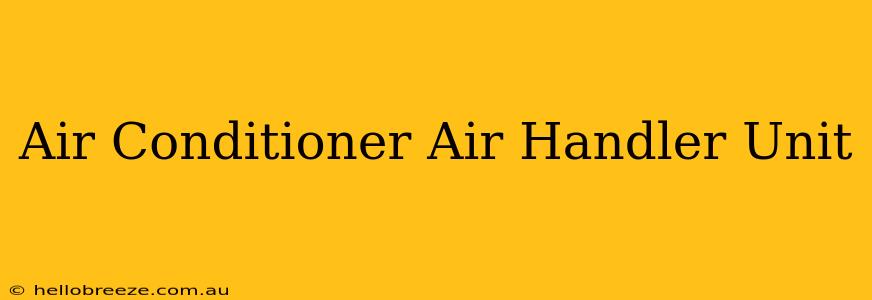An air conditioner's air handler unit is a critical component often overlooked. Understanding its function, maintenance, and potential problems is key to maximizing your HVAC system's efficiency and longevity. This comprehensive guide delves into everything you need to know about air handler units.
What is an Air Handler Unit?
The air handler unit is the indoor portion of your central air conditioning and heating system. Unlike the outdoor condenser unit which handles refrigerant, the air handler circulates air throughout your home. It's the unsung hero responsible for distributing conditioned air to the various rooms in your house. Think of it as the lungs of your HVAC system.
Key Components of an Air Handler Unit:
- Blower: This powerful fan moves air throughout the ductwork.
- Evaporator Coil: This coil absorbs heat from the air, cooling it before it's circulated. This is where the refrigerant absorbs heat from the air.
- Filter: This crucial component traps dust, allergens, and other airborne particles, improving indoor air quality. Regular filter changes are essential for optimal performance.
- Airflow Control: Dampers or registers regulate airflow to individual rooms.
- Control Board: This manages the various components of the unit, including the blower motor, fan speed, and other functions.
Types of Air Handler Units:
- Gas Furnaces: Often paired with air handlers for efficient heating and cooling.
- Electric Furnaces: Provide heating capabilities alongside the air handler's cooling functions.
- Heat Pumps: Provide both heating and cooling using a single unit.
Maintaining Your Air Handler Unit: A Proactive Approach
Regular maintenance significantly extends the life and efficiency of your air handler unit. Here's what you should do:
Regular Filter Changes:
Changing your air filter is the simplest yet most impactful maintenance task. A clogged filter restricts airflow, forcing the system to work harder, leading to increased energy consumption and potential damage. Aim to replace your filter every 1-3 months, or more frequently if you have pets or allergies.
Coil Cleaning:
The evaporator coil can become dirty over time, reducing its efficiency. While professional cleaning is recommended, you can try carefully cleaning the coil's exterior with a coil cleaning brush and vacuum.
Professional Maintenance:
Annual professional inspections are highly recommended. A qualified HVAC technician can inspect the entire system, clean or replace components, and identify potential problems before they escalate into costly repairs. This is especially crucial for identifying issues like refrigerant leaks early on.
Troubleshooting Common Air Handler Problems:
- Weak Airflow: Check the filter for clogs, and look for any obstructions in the ductwork.
- Strange Noises: Grinding or rattling noises could indicate loose components or bearing problems.
- Frozen Coils: This often points to low refrigerant levels or restricted airflow.
- Frequent Cycling: This could be a sign of a problem with the thermostat, refrigerant levels, or other components.
When to Call a Professional:
If you notice any unusual noises, reduced airflow, or the system isn't performing as expected, it’s always best to contact a qualified HVAC technician. Ignoring problems can lead to more expensive repairs down the line.
Conclusion: The Heart of Your Home Comfort
The air handler unit plays a vital role in maintaining a comfortable indoor environment. By understanding its function, performing regular maintenance, and addressing problems promptly, you can ensure the efficiency, longevity, and optimal performance of your entire HVAC system. A little proactive care goes a long way in keeping your home cool, comfortable, and energy-efficient all year round.

